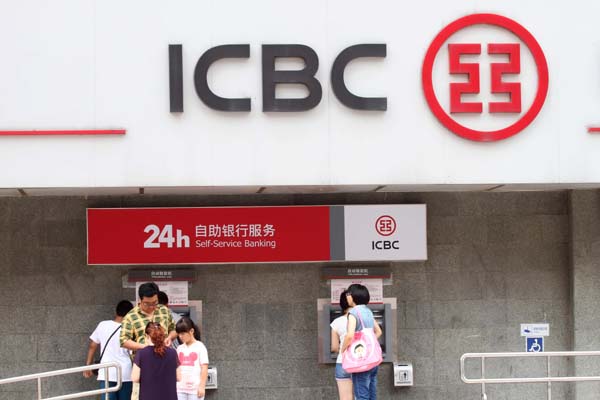

Institution joins list of powerful global financial organizations
Yet another Chinese bank has been listed by the Financial Stability Board as too big to fail, underscoring China's growing significance in the global financial system.
Industrial and Commercial Bank of China Ltd, the country's biggest bank by assets, has been added to the list of banks identified by the board as systemically important in its latest report published on Tuesday, bringing the overall number from 28 to 29.
Bank of China Ltd was on the list for the third consecutive year since 2011, when the board first published the annual list.
|
 |
|
People use ATMs at an Industrial and Commercial Bank of China Co branch in Beijing. The bank, the nation's largest by assets, was put on the list of banks of systemic importance in the global financial industry.?[Photo/China Daily] |
A bank that fails might trigger a financial crisis and is seen by the board as systemically important. Banks on the list are required to have a higher capital buffer to avert any repeat of the 2008 credit freeze.
ICBC had a core capital ratio of 10.48 percent as of June 30, while Bank of China's was 9.27 percent, both above the 8.5 percent level the China Banking Regulatory Commission requires the nation's systemically important banks to hold by the end of 2018.
The board is compiling the list in preparation for capital rules scheduled to be phased in starting in 2016.
It brings together banking officials from the Group of 20 nations to coordinate financial rule-making. In November 2011, the board listed the first group of systemically important banks, to be updated each year in November. The board is chaired by Mark Carney, governor of the Bank of England.
ICBC's addition to the list benefited from the Chinese yuan's growing internationalization and its own global business expansion.
A report published by the Society for Worldwide Interbank Financial Telecommunication in October shows that the yuan has already overtaken the Swedish krona, the South Korean won and the Russian rouble as the world's eighth most actively traded currency.
In the first nine months of the year, ICBC processed 1.5 trillion yuan ($245 billion) in cross-border transactions. Its yuan-clearing network has grown to cover 70 nations and regions worldwide.
Fitch Ratings Inc, a rating agency, said in a research note on Tuesday that the deepening of Chinese companies' trade and investment linkages in overseas markets creates financing opportunities for Chinese banks.
"Greater usage of the yuan in the invoicing of bilateral trade or through 'qualified' investments is an increasingly visible objective of the Chinese policy authorities. A complementary expansion of Chinese banks' presence abroad, which may facilitate the fulfillment of these objectives, therefore makes increasing sense," the agency wrote.
ICBC has been speeding up its global push in recent years. As of the end of June, ICBC's overseas assets reached $182.2 billion, accounting for 6 percent of its total assets. By the end of last year, ICBC had 383 branches in 39 countries and regions, the largest overseas branch network of any Chinese bank.
"ICBC's transforming itself from a major Chinese bank to a major global bank and carrying more and more weight in the global financial system. We will see more and more Chinese banks on the list as the yuan goes global," said Jin Lin, a banking analyst with Orient Securities Co Ltd in Shanghai.